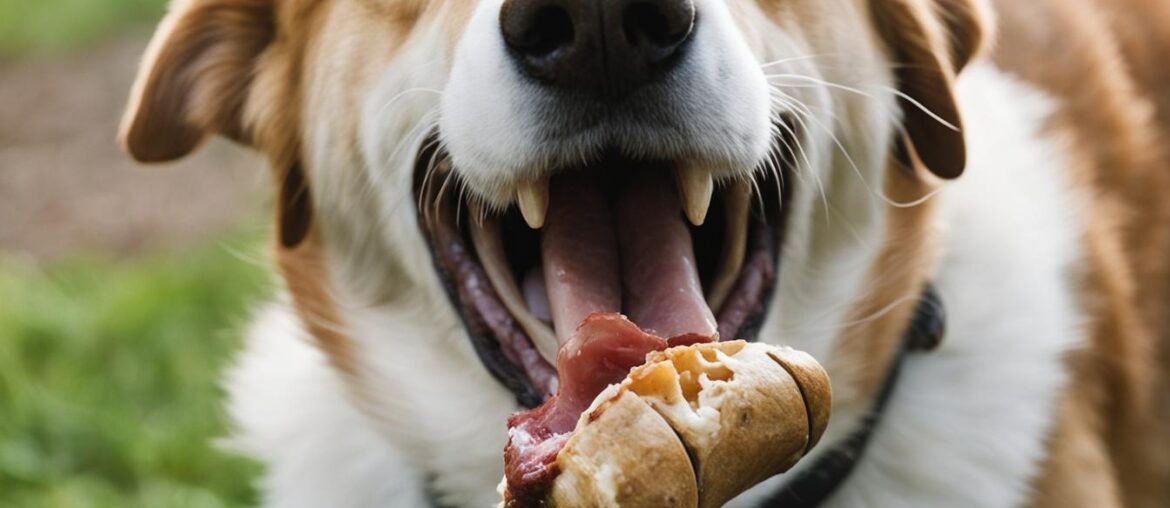As a responsible pet owner, it’s essential to be knowledgeable about what foods are safe for your furry friends. One common question that arises is whether dogs can eat bones from pork. Generally, it is not safe for dogs to consume pork bones, whether raw or cooked.
Key Takeaways:
- Pork bones, both raw and cooked, are likely to splinter and crack when chewed on by dogs, posing various risks to their health.
- Small pork bones can be a choking hazard and may cause intestinal blockages or damage to the dog’s esophagus or intestines.
- It is recommended to offer large, raw, cow bones or bison bones instead, as they are less prone to splintering and causing harm to the dog.
- Always supervise your dog while they are chewing on any bone and consult with a veterinarian for guidance on safe bone options.
- When in doubt, prioritize your pet’s safety and well-being by avoiding pork bones altogether.
Why Aren’t Pork Bones Safe for Dogs?
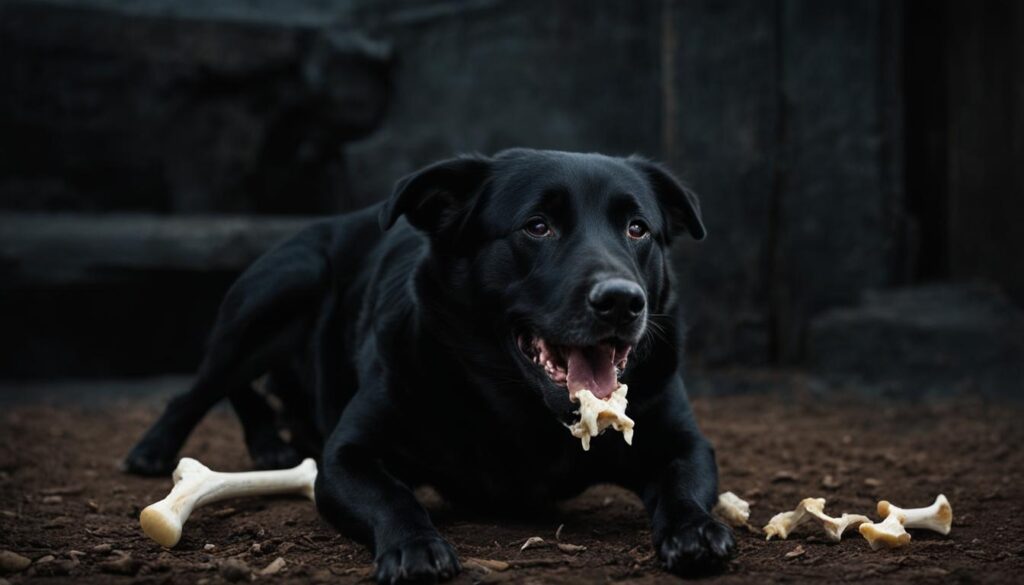
The main reason why pork bones are not safe for dogs is because they have a tendency to splinter and crack when chewed on. Small pieces of the bone can be swallowed by the dog, leading to choking, intestinal blockages, or damage to the esophagus or intestines. This can be extremely dangerous and potentially life-threatening for the dog.
Big dogs might also attempt to swallow small pork bones whole, which can cause similar risks. Due to these dangers, it is best to avoid giving dogs bones from pork.
Instead, opt for safer alternatives such as large, raw cow bones or bison bones. These types of bones are less likely to splinter and cause harm to the dog. However, it is important to supervise the dog while they are chewing on any bone to ensure their safety.
“Small pieces of the bone can be swallowed by the dog, leading to choking, intestinal blockages, or damage to the esophagus or intestines.”
Dangers of Pork Bones for Dogs
Pork bones pose several dangers to dogs due to their propensity to splinter and crack when chewed on. The sharp fragments can cause a range of issues including:
- Choking hazards
- Intestinal blockages
- Damage to the esophagus or intestines
These risks can be life-threatening and require immediate attention. It is important to prioritize the safety of our furry friends by avoiding giving them bones from pork.
Risks of Giving Dogs Pork Bones
When dogs consume pork bones, they expose themselves to various risks and potential harm. These risks include:
- Choking on bone fragments
- Intestinal blockages from swallowed bones
- Esophageal or intestinal damage from sharp bone fragments
The dangers associated with pork bones make it crucial to refrain from giving them to our canine companions.
| Dangers of Pork Bones for Dogs | Risks of Giving Dogs Pork Bones |
|---|---|
| Choking hazards | Choking on bone fragments |
| Intestinal blockages | Intestinal blockages from swallowed bones |
| Damage to the esophagus or intestines | Esophageal or intestinal damage from sharp bone fragments |
Are Any Bones Safe for Dogs to Eat?
While pork bones are not safe for dogs to eat, there are other types of bones that can be given to dogs safely. Large, raw, cow bones or bison bones are considered to be safe for dogs to chew on. It is important that the bone is big enough so that the dog cannot attempt to swallow it, and it must be raw to prevent splintering. It is always recommended to supervise the dog when giving them a bone to ensure their safety.
Tips for Giving Dogs Bones
- Choose large bones that the dog cannot attempt to swallow.
- Do not leave the dog unattended while they are chewing on the bone.
- Throw out completely gnawed bones to avoid any problems.
- Rotate the bones to keep the dog interested and to clean different areas of their teeth.
- Avoid letting the dog chew on bones without breaks to reduce the chance of injury.
- After the dog enjoys their bone, provide them with fresh water to stay hydrated.
| Type of Bone | Safety Level |
|---|---|
| Large, raw, cow bones | Safe for dogs |
| Bison bones | Safe for dogs |
What Should I Do if My Dog Eats a Pork Bone?
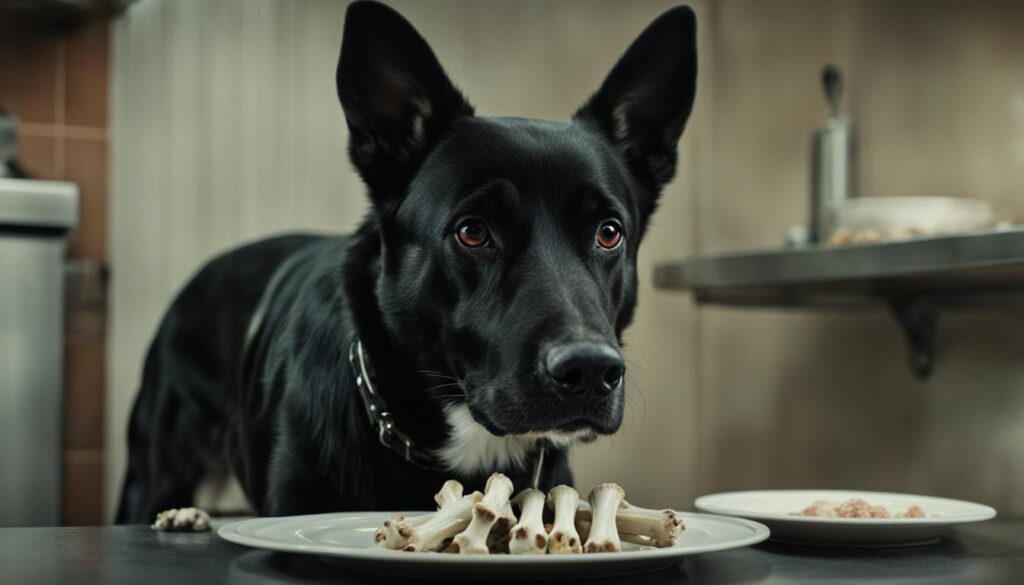
If your dog manages to eat a pork bone, it is crucial to take immediate action to ensure their safety and well-being. Here are the steps you should follow:
- Remove the Bone: If possible, try to take the bone away from your dog. However, do not attempt to retrieve the bone if it poses a risk to your own safety.
- Monitor Your Dog: If your dog has already swallowed the bone or a part of it, closely observe their behavior. Look out for any signs of distress or discomfort.
- Watch for Distress Signs: Keep an eye out for symptoms such as vomiting, excessive drooling, abnormal bowel movements, or a lack of appetite. These could indicate that the bone has caused an issue.
- Consult a Veterinarian: If you notice any distress signs or are unsure about the potential dangers, it is crucial to seek veterinary assistance immediately.
The vet will be able to assess the situation and advise you on the best course of action. Depending on the severity of the situation, the vet may recommend:
endoscopy or surgery to remove the bone from the dog’s digestive system, or
close monitoring if the bone is expected to pass through the dog’s system without causing harm.
Remember, every situation is unique, and it is essential to seek professional guidance to ensure the safety and health of your dog.
| Signs of Distress | |
|---|---|
| 1. Vomiting | Experiencing episodes of vomiting |
| 2. Excessive Drooling | Unusually excessive drooling or foaming at the mouth |
| 3. Abnormal Bowel Movements | Displaying diarrhea, constipation, or other irregularities in bowel movements |
| 4. Lack of Appetite | Showing a decreased or complete loss of appetite |
What Are Some Other Uses for Pork Bones?
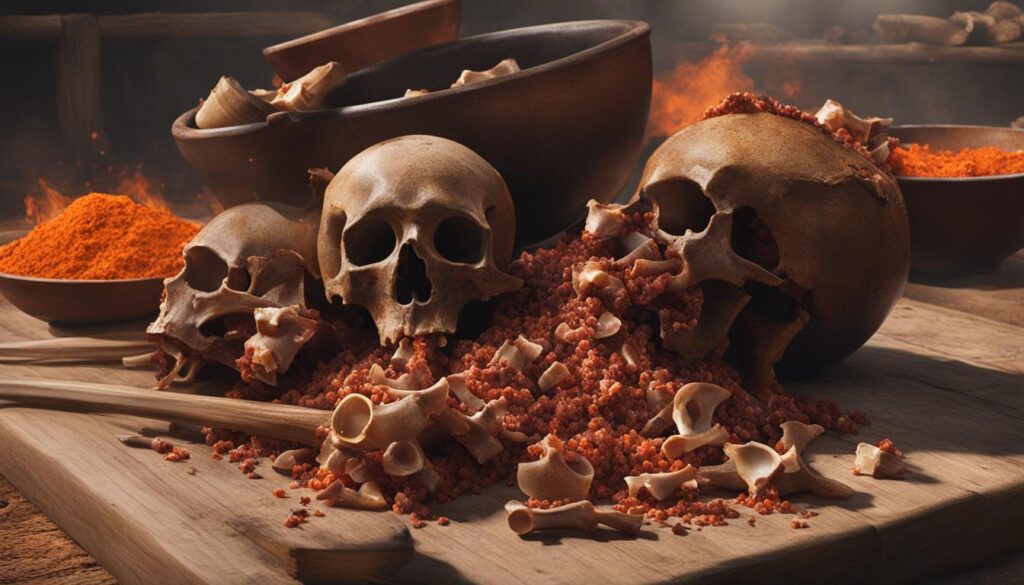
Instead of giving pork bones to dogs, there are alternative ways to use them. One option is to make a flavorful broth from the bones. The broth can be a great addition to a dog’s food, providing extra taste and nutrition.
Making pork bone broth is relatively easy. Simply take the leftover pork bones and simmer them in water for several hours. This slow cooking process helps to extract the rich flavors and nutrients from the bones.
After simmering, strain the broth to remove any bone fragments, and let it cool before serving. It can then be mixed with your dog’s regular food or used as a nutritious and tasty treat.
However, it is important to consult with a veterinarian before giving your dog a bone broth, especially if your dog has any specific dietary or digestive issues. The vet will be able to provide guidance on the appropriate amount to give and whether it is suitable for your dog’s individual needs.
Benefits of Using Pork Bones for Broth:
- Aids in digestion
- Boosts the immune system
- Provides essential minerals
- Supports joint health
I have found that making bone broth from pork bones is a fantastic way to utilize them without putting my dog’s health at risk. It not only adds a delicious flavor to his meals, but also provides additional health benefits.
In addition to making bone broth, you can also use pork bones to enhance the flavor of soups, stews, and sauces. The bones can be added during the cooking process and removed before serving to infuse the dishes with a rich and robust taste.
So, instead of discarding pork bones, consider these alternative uses to maximize their potential and elevate your dog’s dining experience.
Why Some Bones Are Off Limits
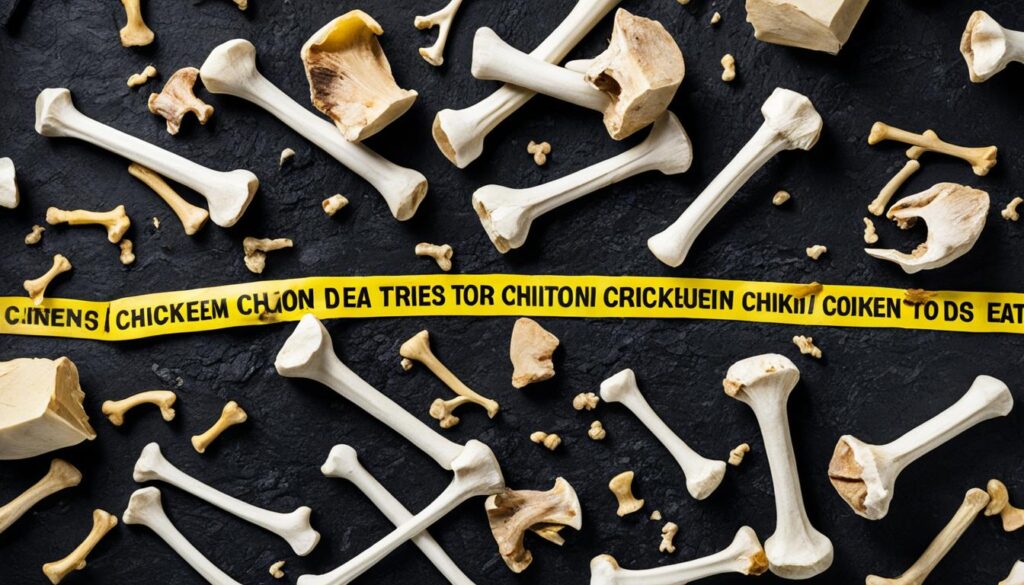
Not all bones are safe for dogs to eat. It is important to be aware of the bones that should be avoided to ensure the safety and well-being of your furry friend. Here are some bones that are considered unsafe for dogs:
Dangerous Bones for Dogs
- Small Bones: Dogs should never be given small bones, especially those that can easily fit into their mouth. These bones can pose a choking hazard if swallowed whole.
- Cooked Pork Bones: Cooked pork bones should be avoided as they become softer and more prone to splintering. Splintered bones can cause injuries such as broken teeth or blockages in the intestines.
- Cooked Pork: Just like cooked pork bones, cooked pork itself should be avoided. It can be greasy and difficult for dogs to digest, leading to gastrointestinal issues.
- Weight-Bearing Bones: Weight-bearing bones, such as femur bones, can be too hard and heavy for dogs to chew on. They can pose a risk of tooth damage if the dog’s teeth are not strong enough.
When it comes to bones, it is crucial to prioritize your dog’s safety. Instead of risking their health with unsafe bones, it is recommended to choose bones that are safe for dogs to chew on.
| Bones to Avoid for Dogs | Reasons to Avoid |
|---|---|
| Small Bones | Choking hazard when swallowed |
| Cooked Pork Bones | Increased risk of splintering and injuries |
| Cooked Pork | Greasy and difficult to digest |
| Weight-Bearing Bones | Risk of tooth damage |
Can Dogs Eat Pork Bones? Yes, But It Depends.
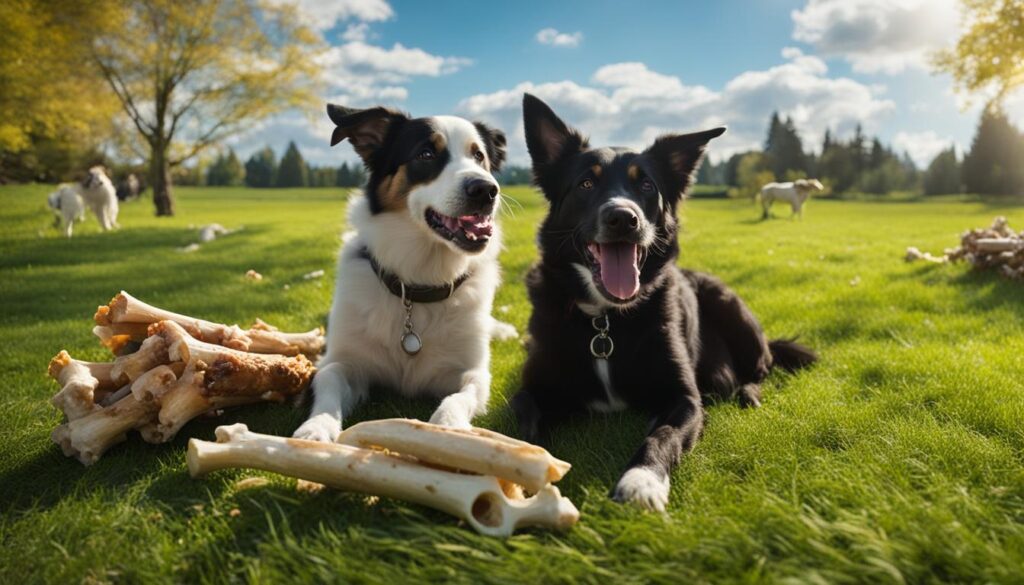
While it is generally not recommended to give dogs pork bones, there are some exceptions. Smoked pork bones can be a safer option, as they are less likely to splinter and cause harm to the dog. Smoked pork bones, especially those that are stuffed with meat like pork jerky, can provide entertainment and chewiness for the dog. However, it is still important to supervise the dog while they are chewing on the bone to ensure their safety.
Smoked Pork Bones vs. Raw Pork Bones
When it comes to giving dogs pork bones, the safety factor mostly depends on the method of preparation. Smoked pork bones are cooked at a lower temperature and for a longer duration, which makes them less likely to splinter compared to raw pork bones. The smoking process further adds flavor and the stuffed meat inside can keep your dog engaged for longer periods of time.
Supervision is Key
Even though smoked pork bones are considered safer than raw ones, it’s crucial to supervise your dog while they are chewing on the bone. This way, you can quickly identify any potential issues, such as the bone becoming small enough to swallow or the dog trying to break it into smaller pieces. It also allows you to intervene if you notice any signs of discomfort or distress.
Consult with Your Veterinarian
Before introducing any bones, including smoked pork bones, into your dog’s diet, it is advisable to consult with your veterinarian. They can evaluate your dog’s specific needs, health condition, and dietary requirements to provide personalized guidance and recommendations. Your veterinarian can also help you determine the appropriate size and type of bones for your dog.
| Pros of Smoked Pork Bones | Cons of Smoked Pork Bones |
|---|---|
| – Less likely to splinter compared to raw pork bones | – Still a potential risk of choking or blockage |
| – Smoky flavor enhances the chewing experience | – Risk of dental fractures or injuries if not appropriately sized |
| – Can keep dogs occupied for longer periods | – Individual dog’s tolerance and digestion can vary |
How To Give A Dog A Bone – Tips & Tricks
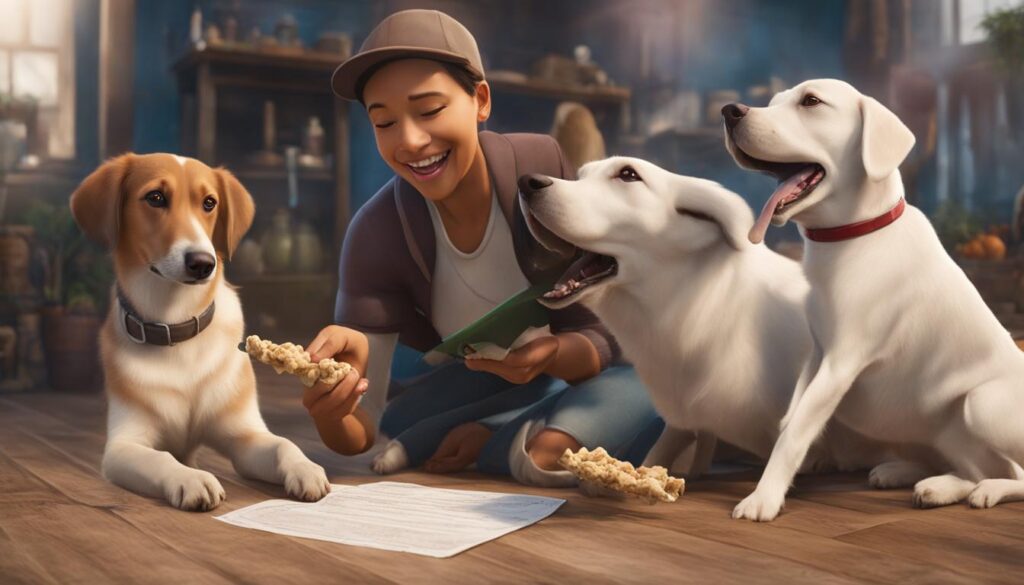
When it comes to giving your dog a bone, it’s essential to follow some guidelines to ensure their safety and enjoyment. Here are some tips and tricks for giving dogs bones:
- Choose the right size: Select large bones that your dog cannot attempt to swallow. This helps prevent choking or blockages in their digestive system.
- Never leave them unattended: Always supervise your dog while they are chewing on a bone. This allows you to intervene if any issues arise and ensures their safety.
- Discard completely gnawed bones: Once the bone has been thoroughly chewed and there is nothing left to consume, throw it away. This helps prevent your dog from attempting to swallow small bone fragments.
- Rotate the bones: Provide your dog with different types of bones to keep them interested and engage different areas of their teeth. This also helps promote dental health.
- Give them breaks: Avoid allowing your dog to chew on bones without breaks. Continuous chewing can increase the risk of dental fractures or other injuries. Encourage periodic breaks to reduce the chance of harm.
- Hydration is key: After your dog enjoys their bone, make sure to provide them with fresh water to stay hydrated.
Following these guidelines will help ensure that your dog can safely enjoy the benefits of chewing on bones. Remember, if you have any concerns or questions, it’s always best to consult with your veterinarian.
| Tip | Description |
|---|---|
| Choose the right size | Select large bones that your dog cannot attempt to swallow. This helps prevent choking or blockages in their digestive system. |
| Supervise your dog | Always watch your dog while they chew on a bone to ensure their safety and intervene if any issues arise. |
| Discard completely gnawed bones | Throw away bones that have been thoroughly chewed to prevent your dog from attempting to swallow small fragments. |
| Rotate the bones | Provide different types of bones to keep your dog interested and engage different areas of their teeth. |
| Give them breaks | Encourage periodic breaks during bone chewing to reduce the risk of dental fractures or other injuries. |
| Keep your dog hydrated | After your dog enjoys a bone, provide them with fresh water to stay hydrated. |
Wrapping Up
In conclusion, it is not safe for dogs to eat bones from pork. The splintering nature of pork bones poses significant risks to dogs, including choking hazards, intestinal blockages, and potential damage to their esophagus or intestines. While large, raw, cow bones or bison bones can be a safer alternative for dogs to chew on, it is essential to supervise them during bone chewing sessions to ensure their safety.
Consulting with a veterinarian before giving any type of bones to a dog is highly recommended. Veterinarians can provide specific recommendations based on the individual dog’s size, chewing habits, and overall health. Their expertise will help ensure the dog’s safety and well-being.
Ultimately, the health and safety of our furry friends should always be our top priority. While it may be tempting to share pork bones as a treat, it is crucial to consider the potential risks and opt for safer alternatives. Providing dogs with appropriate toys and treats specifically designed for their chewing needs is the best way to keep them entertained and satisfied without compromising their health.
FAQ
Can dogs eat bones from pork?
No, it is not safe for dogs to eat bones from pork. Pork bones, whether raw or cooked, are likely to splinter and crack when chewed on by dogs, posing a risk of choking, intestinal blockages, or injury to the esophagus or intestines.
Why aren’t pork bones safe for dogs?
Pork bones are not safe for dogs because they can splinter and crack, leading to potential harm. Small pieces of the bone can be swallowed, causing choking or blockages, and big dogs might try to swallow small bones whole, which is extremely dangerous.
Are any bones safe for dogs to eat?
Yes, there are safe alternatives. Large, raw, cow bones or bison bones can be given to dogs for chewing. These bones are less likely to splinter and cause harm. However, it is crucial to supervise the dog while they are chewing and ensure they do not attempt to swallow the bone.
What should I do if my dog eats a pork bone?
If your dog manages to eat a pork bone, take immediate action. If possible, remove the bone from the dog’s reach. Monitor your dog closely for signs of distress, such as vomiting, excessive drooling, abnormal bowel movements, or lack of appetite. If you notice any of these symptoms, take your dog to the vet right away for further evaluation and treatment.
What are some other uses for pork bones?
Instead of giving pork bones to dogs, you can use them to make a broth. The broth can be mixed with your dog’s food to add flavor. However, it is important to consult with your veterinarian, especially if your dog has any intestinal or dietary issues.
Why are some bones off limits for dogs?
Not all bones are safe for dogs to eat. Small bones that can fit easily into a dog’s mouth should be avoided as they can be swallowed and pose a choking hazard. Cooked pork bones and other weight-bearing bones are also unsafe because they are more prone to splintering, tooth damage, and intestinal blockages.
Can dogs eat pork bones?
While it is generally not recommended to give dogs pork bones, there are some exceptions. Smoked pork bones, especially those that are stuffed with meat like pork jerky, can be a safer option as they are less likely to splinter. However, always supervise your dog while they are chewing on any type of bone.
How can I give a dog a bone safely?
When giving a dog a bone, choose large bones that the dog cannot attempt to swallow. Never leave the dog unattended while they are chewing on the bone. Discard completely gnawed bones to prevent any problems. Rotate the bones to keep the dog interested and to clean different areas of their teeth. Avoid prolonged chewing without breaks to reduce the risk of injury. Afterward, offer your dog fresh water to stay hydrated.
What is the conclusion about dogs eating pork bones?
In conclusion, it is not safe for dogs to eat bones from pork. Pork bones are likely to splinter and can cause choking, blockages, or damage to the esophagus or intestines. There are safer alternatives like large, raw, cow bones or bison bones, but it is crucial to supervise your dog while they are chewing. Consult with your veterinarian for personalized advice on bone safety for your dog.


